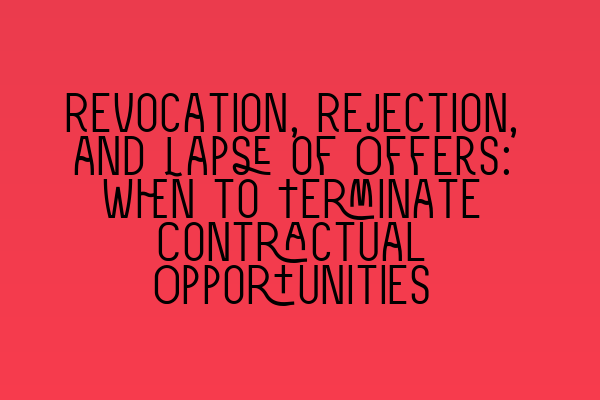Revocation, Rejection, and Lapse of Offers: When to Terminate Contractual Opportunities
In the dynamic world of contract law, it is crucial for solicitors to have a firm grasp on the concepts of revocation, rejection, and lapse of offers. These legal principles play a significant role in determining the validity and enforceability of contractual agreements. Understanding when and how to terminate contractual opportunities can save both solicitors and clients from potential legal disputes and financial repercussions. In this blog post, we will delve into the intricacies of revocation, rejection, and lapse of offers, providing you with the essential knowledge to navigate these areas with confidence.
Revocation of Offers: When can an offer be withdrawn?
Revocation refers to the act of withdrawing an offer before it has been accepted. Generally, an offer can be revoked at any time before acceptance unless it is irrevocable.
An offer can be revoked by the offeror directly communicating the revocation to the offeree. This can be done through various means, such as phone, email, or face-to-face conversation. It is crucial for solicitors to advise their clients on the proper method of communication to ensure the revocation is valid and legally binding.
Additionally, an offer can also be revoked indirectly through the conduct of the offeror. For instance, if the offeror sells the subject matter of the offer to a third party, it is considered an implied revocation. However, the revocation must be communicated to the offeree for it to be effective.
Rejection of Offers: When can an offer be rejected?
Rejection occurs when the offeree declines to accept the offer. It is important to note that rejection terminates the offer, and the original offer cannot be accepted after rejection.
An offer can be rejected through direct communication between the offeree and the offeror. The rejection must be clear and unambiguous to avoid any confusion or misunderstandings.
It is essential for solicitors to educate their clients on the importance of promptly communicating rejections to prevent any potential legal disputes. A rejection communicated after acceptance has already taken place is considered ineffective and does not terminate the offer.
Lapse of Offers: When do offers lapse?
Offers can also lapse due to various reasons, including the passage of time, failure to meet specific conditions, or the death or insanity of either party. Understanding the circumstances under which an offer lapses is crucial for solicitors when advising their clients.
An offer lapses when a specific time period stated by the offeror passes without acceptance. If no time period is specified, the offer generally lapses after a reasonable period of time. What constitutes a reasonable period depends on the nature of the offer, the subject matter, and the circumstances surrounding the offer.
Offers also lapse if the offeree fails to meet any conditions stated by the offeror. For example, if the offeror specifies that acceptance must be communicated in writing by a certain date, and the offeree fails to meet this condition, the offer will lapse.
Furthermore, if either party becomes incapacitated due to death or insanity before acceptance, the offer automatically lapses. It is crucial for solicitors to be aware of these situations and advise their clients accordingly.
Conclusion
As solicitors, having a comprehensive understanding of revocation, rejection, and lapse of offers is vital when dealing with contractual opportunities. By being well-versed in these legal principles, you can effectively navigate the complexities of contract law and ensure that your clients’ interests are protected.
If you found this blog post insightful, you may also find the following articles on our website relevant and helpful:
– Navigating Legal Challenges and Pitfalls in Your Practice: Link
– Barrister vs. Solicitor: A Comprehensive Comparison: Link
– Understanding the SRA Competence Statement: A Guide for Solicitors: Link
– Exploring Different Solicitor Specializations: Finding Your Niche: Link
– Top Recommendations for Law Schools in the UK: Link
We hope you have found this blog post informative and valuable in your journey as a solicitor. Should you require any further assistance or have any legal inquiries, please do not hesitate to contact us.
